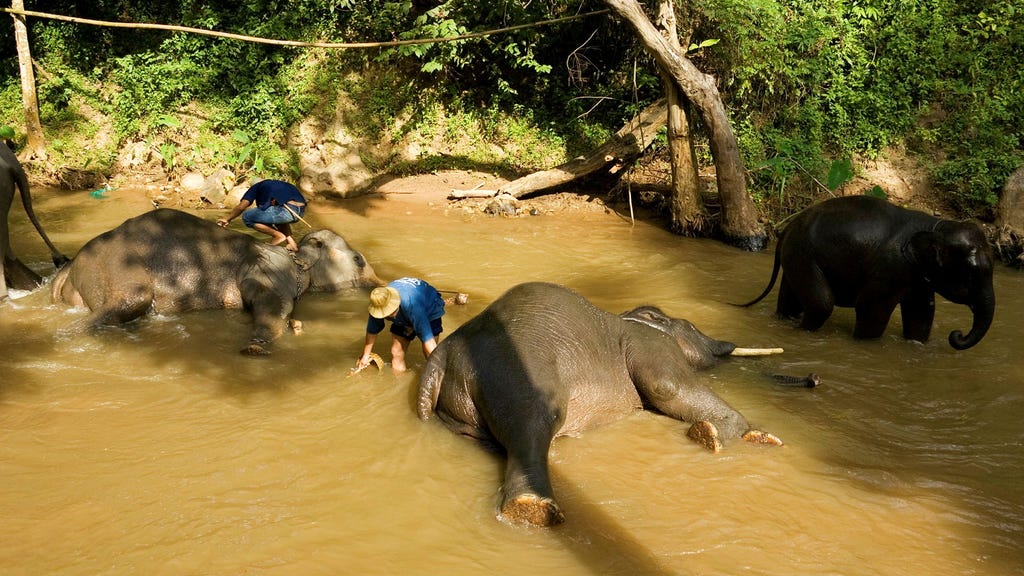The tragic death of a 22-year-old Spanish student at a popular elephant center in southern Thailand has cast a harsh spotlight on the ethical implications of elephant tourism. The incident occurred last Friday during a tourist activity involving bathing with elephants, a popular attraction at the center located on Koh Yao Yai island. According to police reports, the female elephant involved in the incident ”panicked” during the activity and attacked the student, reportedly goring her with its tusks. The young woman sustained severe injuries and later succumbed to them at a local hospital. Her boyfriend witnessed the horrifying event. In the aftermath of the tragedy, a 38-year-old elephant handler has been charged with negligence related to the incident.
The incident has reignited debate surrounding the welfare of elephants used in tourism and the potential risks associated with close interactions between humans and these powerful animals. While bathing with elephants is a lucrative draw for tourists in Thailand, and the center in question allows visitors to feed, walk, and shower with the animals, animal rights activists have long voiced concerns about the practice. They argue that such activities disrupt the natural behavior of elephants, subjecting them to undue stress and potentially jeopardizing their physical and psychological well-being. The inherent power imbalance in these interactions also poses a significant risk to human safety, as tragically illustrated by this recent incident.
The incident underscores the complex and often contentious relationship between wildlife conservation, tourism, and animal welfare. Thailand’s elephant tourism industry is substantial, with an estimated 4,000 elephants currently held in captivity. While some argue that these activities contribute to conservation efforts by providing economic incentives for elephant protection, critics contend that the welfare of these magnificent creatures is often compromised in the pursuit of profit. The inherent conflict lies in balancing the economic benefits of tourism with the ethical responsibility to ensure the humane treatment of animals.
The practice of using elephants for entertainment and tourism has a long history in Thailand, deeply rooted in cultural traditions. Historically, elephants played a vital role in logging and transportation, and their strength and intelligence were revered. As these traditional roles diminished, elephants transitioned into the tourism sector, offering rides, performances, and interactive experiences for visitors. However, the shift to tourism has brought its own set of challenges, raising concerns about appropriate training methods, living conditions, and the potential for exploitation. The pressure to meet tourist demand can create an environment where the welfare of the animals is secondary to profit maximization.
The legal ramifications of the incident are still unfolding, with the elephant handler facing charges of negligence. This legal action will likely delve into the specific circumstances surrounding the attack, including the handler’s training, the safety protocols in place at the center, and the elephant’s history. The outcome of this case could have significant implications for the wider elephant tourism industry in Thailand, potentially leading to stricter regulations and greater scrutiny of animal welfare practices. This tragic event serves as a stark reminder of the inherent risks associated with close human-wildlife interactions and the importance of prioritizing animal welfare in tourism activities.
Moving forward, the focus should be on developing sustainable and ethical tourism practices that prioritize the well-being of elephants. This requires a multi-pronged approach, including stricter regulations and enforcement, improved training and education for elephant handlers, and greater public awareness of the ethical considerations surrounding elephant tourism. Encouraging alternative forms of elephant tourism that minimize human interaction and prioritize natural behaviors, such as observation in sanctuaries or responsible trekking operations, could offer a more sustainable and ethical path forward. Ultimately, the goal should be to create a tourism model that benefits both elephants and the communities that depend on them, ensuring their long-term survival and well-being.














